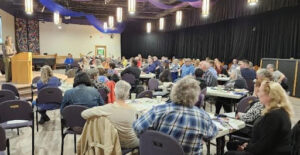
Nothing captured the spirit of the May 6/24 Housing Solutions Now! event more than Graham Cubitt’s proposed schedule for ground breaking ceremonies. If federal money was approved for Hamilton non-profit housing projects tomorrow (Tuesday May 7), he said, an Indwell project could start by Friday. Another ground breaking could be held in June and a third in July. Housing providers in Hamilton are that ready to build hundreds of new units, he told the 75-80 people present.

Graham (left) is director of development with Indwell, which has its building permits to start 23 units of supportive housing for families now. Medora Uppal, another speaker (behind Graham, left), is CEO of the YWCA which could start 90 units of supportive housing for women, children and gender-diverse people in July. The two handed out cards showing exactly what financing is needed, from the federal and provincial governments, for eight projects, more than 400 units, ready to start this year. Both emphasized that while affordable housing just needs funding to build units, supportive housing needs that as well as operating funds, from the province, for health, mental health and other services some people, including many with long experiences of homelessness, need to stay housed and to thrive.
Bill Johnston, of our church, outlined hopeful city, provincial and federal initiatives, as well as how far they fall short of the need. (28,000 Hamilton households are in core housing need, facing either poor housing or housing costs that exceed, sometimes by a lot, 30 per cent of their gross income.) Alarmingly, he noted that Hamilton taxpayers are paying a rapidly rising share of local housing costs that the federal and provincial governments once shared more fully.
Karl Andrus and Mohammed Shalalfeh, of the Hamilton Community Benefits Network, which organized the event with our Affordable Housing Team, laid out the prospects for community benefits—including new affordable housing—from the LRT project. And Karl outlined a number of bold steps the city could take to, among other things, raise significant local funds to reduce the need to beg Ottawa and Queen’s Park for funds to build new units, repair existing ones or let non-profits buy private-sector buildings with affordable units to keep them affordable forever.
The room was buzzing as groups of six discussed a couple of issues including ways to promote the ideas described and to seize the opportunities outlined, as well as lots of additional ideas.
